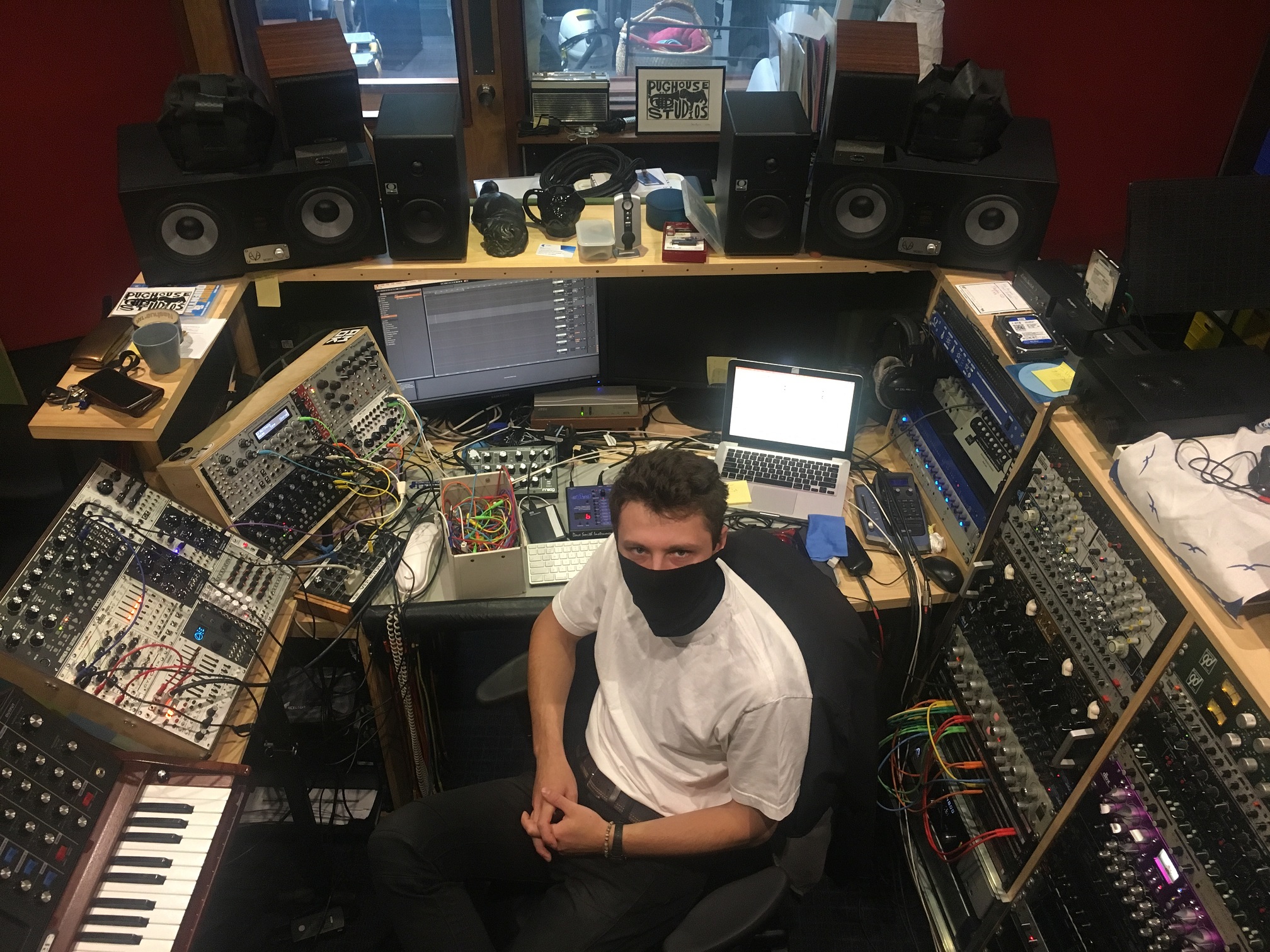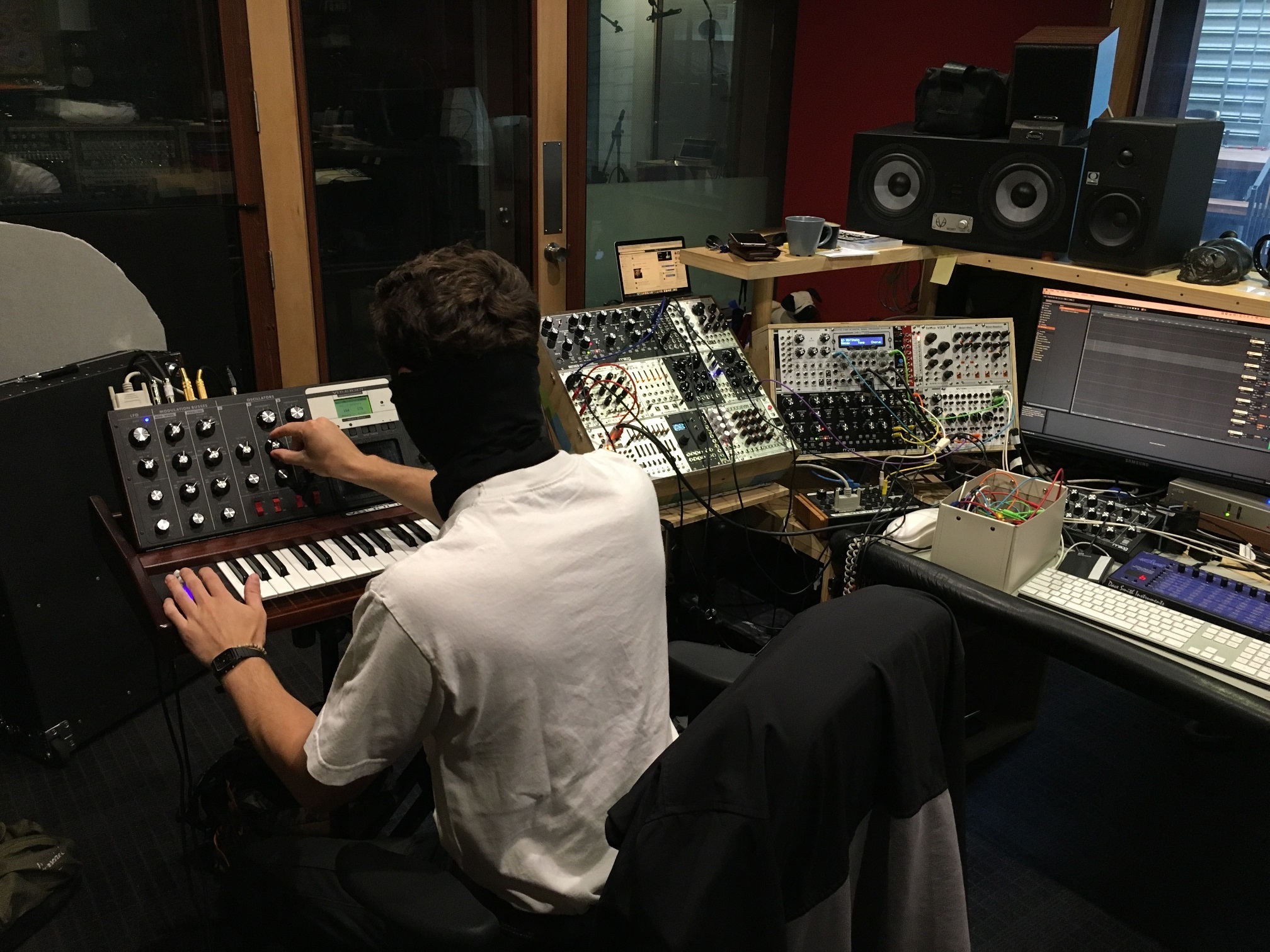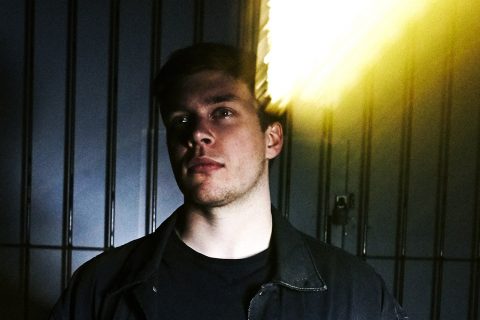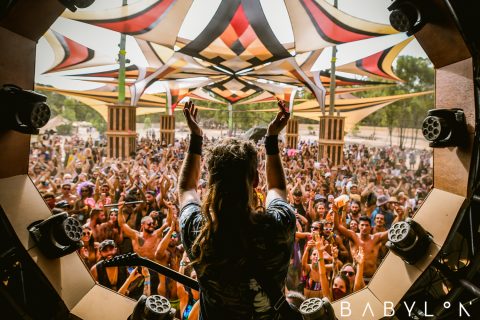Words By Fergus Sweetland.
Enter Catalyst OP1, a mysterious force whose brewing somewhere in the depths of space, orbiting around the Melbourne techno scene.
The masked producer in question sits 2-meters behind me, surrounded by a stadium of hardware equipment. I suspect that he see’s all the electric running through the patch cables as he crafts strange sounds on a modular synth system.

Catalyst’s real name will remain unknown as be prefers to keep it that way. Melbourne has its own anonymous masked technician now. At the age of 23, he has an impressive CV already under his belt. He has bachelor of music in music composition which he studied at the VCA, using his modular systems as his tool for creation, he’s studio audio production, is an assistant to composer Burkhard Dellwitz and has been as assistant studio engineer for 5 years at Pughouse Studios. I hope by now that the picture forming in your head is that Catalyst OP1 means business.
To gauge what tick in the mind of Catalyst, I’d like to draw your attension to the piece of audio below this paragraph. It’s 40 minute continuous play release that Catalyst has just released on his Soundcloud account. It serves as a sonic narrative of a spacecraft on a mission deep into space, all composed by the man himself. What I recommend is that you listen to it back to front to get the full perspective on the piece.
To enter the mind of Catalyst OP1 further, I shot him some questions about his release and other topics.
First things first. One mystery I wish to settle is the suffix to your name “OP1”. Could you expand on this?
I’m interested in the concept of re-incarnation, both in the idea of death/life but also in the concept’s application to musical composition. I felt comforted in the idea that both your carbon and ideas filter back into successive organic and musical life. So to encapsulate this, I added OP1 which is short for Opus 1, a common signifier in the classical music realm to describe works chronologically. Eg, Opus 1, Opus 2, etc.
There’s a story behind the first name too, but for another time maybe.
What brought about the idea of creating the narrative of The Ignition? Is this thematic approach to writing extended pieces of music something you wish to continue into the future?
- Back when I started ‘seriously’ writing music three years ago, I was pretty set on the idea of becoming an orchestral composer. I loved the narrative progression of symphonies in particular and how the changes in sound/rhythm/texture/etc communicate the story.
As well as this, because I don’t really have much of a desire to DJ, I can’t satisfy my need to create longer progressions in techno music without actually making these progressions I want to hear as tracks (or by playing live)… So these two reasons culminate in me starting the story of Op Voyager.
Oh yeah, definitely. This is only the first chapter. The second chapter, The Mechanical City of Arcadia is in the planning process at the moment.

Could you give a breakdown of the narrative behind the tracks and how you applied your compositional skills to create the idea you had in your mind?
So the overall story for this chapter follows a spaceship named ‘OP Voyager’ and its crew as they embark on a reconnaissance mission into deep space. They’re in search of a collection of three Black Holes that have reportedly amassed beyond the Isle of Andromeda and are to determine whether the creation of a portal is possible.
The contents of this chapter is as follows:
00:00 – 8:00 : The Ignition – The crew lock into the spaceship and lift off.
08:00 – 15:15 : Enter Atmosphere – The atmosphere is breached.
15:15 – 19:15 : Signal Loss – Radio communication is lost due to magnetic interference from the impending asteroid field.
19:15 – 27:35 : Asteroid Field – An asteroid field tests the capabilities of the spaceship.
27:35 – End : Black Hole Horizon – Upon exiting the asteroid field, the crew find themselves staring at the black hole horizon.
You were selected by the Melbourne Arts Centre for their 5x5x5x program. As the Arts Centre website states, the program challenges producers to create “…a new composition of five minutes, created especially for five specific sites at Arts Centre Melbourne. Each new work will respond to a specific site, and will seek to illuminate, articulate and draw inspiration from an unusual site”. Can you shed light on the ideas you had for your contribution to the program?
In order to find a site to respond to I took a few solo walks around the facility. Its ridiculously deep, I think something like 50 metres under street level and is a disorientating maze, particularly as there are big mirrors on nearly every section of the walls.
It was at the lowest level accessible to the public where I got the most inspiration. It’s a surreal place when there’s nothing going on. Dead silent, except for the air conditioning, and there’s no echo or room ambience mainly due to the space being curved in the shape of a ‘U’.
The furnishings and design were envisaged in the style of the 50’s/60’s, which further adds to the melancholy of the space. It really is very much like some of the spaces in Biosphere 1 if anyone’s ever played that.
After sitting in the space for a while, I began to feel a little edgy because as I looked around, I couldn’t be sure that when looking at the mirrors that showed reflections of around the bend, that I was indeed looking at a mirror or a doorway to a room yet undiscovered.
That sense of surreal uncertainty was my idea that I tried to capture in the music.
Your music journey never started with electronic music. Could you explain to the reader where your music journey started? When did electronic music enter into the equation for you?
I predominantly played orchestral violin and later double bass until I was about 12, then took up drumming as my dad is a Jazz drummer, so it was convenient I suppose. But I also liked rhythm in general. I then had a big break of about 3-4 years where I didn’t have any formal training or played any instruments (I pretty much played playstation 2 instead…) before getting my first computer and making hip-hop style beats, which was the first step in electronic music.
Two years after I decided I wanted to stay on the music path and study music composition instead of the psychology degree I’d been accepted into. That took me to studying music composition at the Victorian College of the Arts in Melbourne from 2014-2016.
It was mid way through my second year at Uni that I fully decided to go down the modular synthesizer route and the rest is history and still happening to this day.
You have a unique sound that is distinct to your array of hardware. What kind of emotions does the sound invoke within you when you’re going through the process of synthesis?
Well when I’m making sounds, they’re usually to fit a certain emotion or purpose themselves, so the sounds are the result of the emotions rather than the other way around.
Your main tools of choice are your modular synth system and a Moog Voyager Select. Why did you choose to go down the modular path initially and how has your system developed over time? When did the Moog come into the equation?
After about six months to a year of programming plugin synths with a computer mouse to make music, I realised that I needed play an electronic instrument in order to create a meaningful connection between myself and the music.
The modular synthesizer made perfect sense for this as it’s an instrument that can develop along with the person and therefore become unique. Simply replacing one or two modules in your system can drastically alter the sound/rhythms/textures that are possible. This is not possible with non-modular (because they’re not modular) and was the main aspects that convinced me to get a modular… MODULAR!… Mmmmm… The other main reason is how easy it is to experiment and improvise, which is important to me.
The Voyager was a bit of an impulse. It came up for sale for a tantalising price and I convinced myself that it would be a better investment than doing a 2-3 week trip to Japan with my friends, which was the other option for big expenditure at the time.
My friends say it was a sick trip, but I’m yet to regret the decision. Moog also stopped producing the Voyager range soon after I bought it 😉 So even though they made a lot, it’ll probably still go up in price.
Finally, what’s on the horizons for Catalyst OP1?
As mentioned, I’ve started planning the next chapter of OP Voyager but am also starting to work on a release for Manchester based label, Traffic MCR.
The big thing is that I’m moving to Berlin/Leipzig in the middle of the year with the long term idea of studying a Masters of Composition next year.





Comments